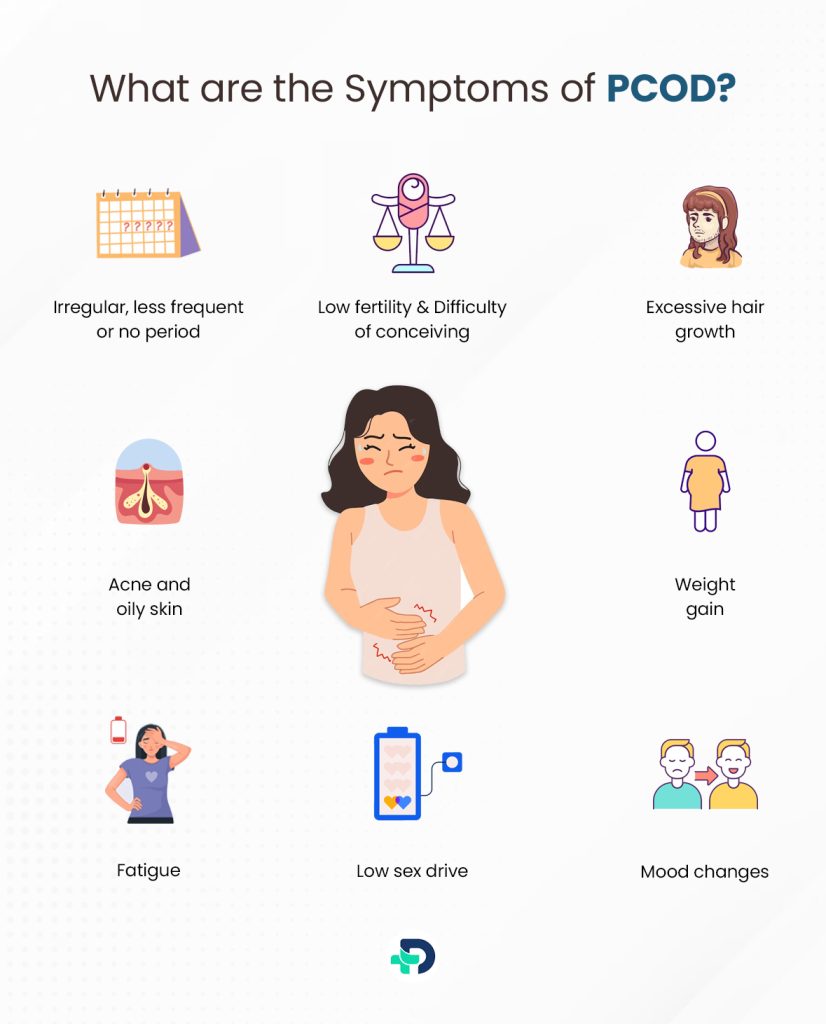PCOD & PCOS: Symptoms, Diagnosis & Management

- PCOD
- 11 Oct 2023
Overview
What is PCOD & PCOS?
PCOS and PCOD refer to disorders that harm the female reproductive organ; the ovary. Your ovary is responsible for releasing ova (reproductive eggs), estrogen and progesterone and a limited amount of what is called androgen (Male Hormone). 1 Overview | Researched based study from The National Health Service About 10% of women around the world has PCOD, being the most common endocrinal problem in females. 3 Overview | Researched based study from Frontiers

Features
Characteristic Features of PCOD & PCOS
- Less frequent, irregular or absent periods (Oligomenorrhea /Amenorrhea) – which means the decreased ability of the ovary to release eggs (ovulation)
- Polycystic ovaries – decreased ability to release eggs with them being studded over each other collecting fluids around them leads to this condition which can be seen by pelvic ultrasound
- High levels of androgen (the male hormone) – Because the ovaries are harmed, severe hormonal release imbalance especially androgen occurs, leading to male-like features like excessive body and facial hair.
Differences
Are PCOD & PCOS the Same?
PCOD
- PCOD is far more common, in which the main problem is the ovary releases immature or incompletely mature eggs.
- This will lead to the ovaries being large, swollen and stuffed with eggs and hormonal imbalance but eggs will eventually be released with high likelihood of getting pregnant.
- PCOD can be easily treated by lifestyle changes
PCOS
- In PCOS, the condition is nearly the same. Still, the problem is mainly excessive androgen release from the ovaries leading to male-like features in females like excessive facial hair, baldness and even infertility.
- Also, in PCOS, eggs are less likely to be released forming cysts around each of them making the ovary very large with less likelihood of getting pregnant without proper treatment.
- PCOS can only be treated by hormonal treatment and medications.2 Differences | Researched based study from United Nations Children’s Fund
PCOD or PCOS which is more dangerous?
- The short answer is PCOS is more dangerous due to the harmful effect of excess androgen on the female body.
- In Addition to the common symptoms of PCOD, PCOS causes what is called metabolic syndrome, a syndrome that increases risk of heart diseases, stroke and types 2 diabetes.
- Also, PCOS causes sleep apnea which means sudden stopping of breathing during sleep or difficulty breathing while sleeping leading to a very disturbed sleeping pattern with a big effect on daily life activities.2 Differences | Researched based study from United Nations Children’s Fund
Symptoms

What are the Symptoms of PCOD?
Many people wonder how do I know I have PCOD? here is a list of the signs of PCOD that one or more may be present according to the severity of the condition;
- Irregular, less frequent or no period
- Low fertility and Difficulty of conceiving (getting pregnant)
- Excessive hair growth especially on the face, back and chest and this is called Hirsutism
- Male-like baldness: Hair thinning or loss
- Acne and oily skin
- Weight gain
- Acanthosis nigricans which refers to the dark pigmented skin of body folds and creases like those in the neck and groin
- Fatigue
- Mood changes
- Low sex drive. 4 Symptoms | Researched based study from Oxford Academic
Causes
What are the Causes of PCOD?
Although it is a very common disorder in females, scientists couldn’t find out the exact cause of PCOD and PCOS but some theories have been confirmed to have a strong link to PCOS suggesting that the following factors alone or all together highly contribute to the disorder;
- Family history: it runs in families possibly due to the presence of specific genes which have not been identified yet.
- Insulin resistance
- Obesity
- Hormones imbalance like
- High levels of testosterone
- High levels of LH
- High levels of prolactin
- Low levels of SHBG 1 Causes | Researched based study from The National Health Service
Complications
Complications of PCOD
Usually, PCOD is not complicated as it is less dangerous than PCOS but it can get worse. Specifically, in PCOS, the condition gets worse as levels of androgen rising affects ovulation, and of course depressed ovulation leads to retention of more and more eggs that retain estrogen inside them which is converted later to more androgen.
Excess androgen of PCOS has serious hazards not only psychologically but also on heart, reproduction and metabolism leading to the following diseases linked to PCOS.
- Lowered possibility of getting pregnant
- Miscarriage or preterm delivery
- Sleep apnea
- Type 2 diabetes
- NASH – Non-Alcoholic Steatohepatitis
- Depression, anxiety and eating disorders
- During pregnancy: Gestational diabetes, Gestational hypertension, and even Preeclampsia.
- Metabolic syndrome – a group of disorders that occur together including; high blood sugar, hypertension (high blood pressure), and high levels of Cholesterol and Triglycerides that increase risk of having cardiovascular disease (Heart and blood vessels) especially coronary heart diseases. 5 Complications| Researched based study from Mayo Clinic
Diagnosis
How is PCOD Diagnosed?
When coming to diagnose PCOD, Doctors look for the three main characteristics of this disorder which are;
- Irregular menstrual period
- High blood levels of androgen
- Cysts seen on the ovary by ultrasound
However, some conditions mimic PCOD and have common symptoms and signs with this disorder, so HCP must exclude them by doing special investigations for these disorders, some of them are;
- Late Onset Congenital adrenal hyperplasia (CAH) – a disorder in which the adrenal gland extensively releases androgens
- Hyperprolactinemia – a disorder in which there are high levels of the Prolactin hormone in the blood.
- Thyroid disorders.
After that, the doctor will do 4 essential steps to confirm the diagnosis:
- Take a full history of you about your menstrual cycle regularity, difficulty getting pregnant (subfertility/infertility), medications, medical disorders, and whether your mother or sister has PCOD because it is known that PCOD runs in families.
- Do a physical examination; your doctor will be interested in looking for signs of high levels of androgen like excess hair growth and acne, and will also measure your body weight, body mass index, and blood pressure
- Blood testing to check levels of sugar, androgen, and cholesterol (to avoid metabolic syndrome)
- Pelvic exam to check for masses or growths in your ovaries or reproductive system
- Ultrasound examination to check the lining of the womb, if your periods are irregular, the doctor will find the lining thick. 6 Diagnosis | Researched based study from National Institutes of Health
Management
How is PCOD Treated?
Being a mild disorder, PCOD can only be treated by changing your lifestyle habits and routine as;
- Take a healthy balanced diet.
- Take enough sleep of average of 8 hours daily
- Exercise regularly and do Yoga
- Avoid smoking, drinking and having junk food.
How to treat PCOS permanently?
On the other hand, PCOS is more dangerous and can’t be treated with only lifestyle and diet changes. However, symptoms can be treated and managed according to the most bothering one as not all symptoms can be treated at once due to the interaction of therapies.
According to the severity and type of symptoms, the type of management will be determined;
Lifestyle and diet changes:
- In Obese women, weight loss markedly improves PCOS symptoms and long-term complications.
- Losing some body weight leads to marked improvement of PCOS symptoms.
- In PCOD, the condition can be treated only by lifestyle changes with no need for medications.
- A BMI of 25-34.9 (Overweight and Obesity Grade I) requires Diet, Sport, and Lifestyle changes.
- A BMI of 35 – 39.9 (Obesity Grade II) might require obesity medications in addition to diet and lifestyle changes.
- A BMI of 40 or more (Obesity Grade III)
- or Grade II with associated diseases like DM, Hypertension, and cardiovascular diseases requires only bariatric surgery.
Medications:
Infertility:
- Selective estrogen receptor modulator (SERM) is the first line treatment of infertility caused by PCOD
- Biguanide anti-diabetic oral drug is a known drug for treating type 2 DM, however it is used in PCOS for lowering insulin resistance and blood sugars which constitutes a very important factor in developing PCOD. Benefits of this drug include stimulating ovulation, regulating periods making it monthly, reduce the risk of miscarriage.
- An aromatase inhibitor is used mainly for treating breast cancer. However, it was found to be effective in stimulating ovulation as a second line after SERM.
- Gonadotrophins are used if all the above methods weren’t effective.
Irregular / Absent periods:
- Contraceptive Pills: are the best methods to have regular monthly periods.
- Intermittent Progesterone: a very good solution to induce periods and start menstruation, can be taken either monthly or every 3 to 4 months.
The mentioned methods are also effective in protection against Endometrial hyperplasia and cancer (Cancer of Womb Lining).
Excessive hair growth in face and body
- Combined Oral Contraceptive pills (COCs): used to treat both Excessive hair and Hair loss
- Anti-androgenic drugs
- Removal of hair by Laser.
IVF for infertility:
- It is considered a last resort if other methods and medications fail to achieve pregnancy with PCOD.
- The back draw of this method is that it might lead to Twins or Triplets pregnancy.
Is surgery needed for PCOS patients?
- For PCOS-associated infertility that doesn’t respond to medications, a minor laparoscopic procedure may be done.
- This microsurgery is called laparoscopic ovarian drilling (LOD)
- Benefits of LOD include lowering blood levels of LH and Testosterone and raising FSH hormone levels that stimulate follicle formation in the ovaries. 1 Treatment | Researched based study from The National Health Service
Any feedback on this article?
 This Articles content was accurate
This Articles content was accurate Very Informative Article
Very Informative Article I have a question or a comment
I have a question or a comment
 This article contains inaccurate content
This article contains inaccurate content This article was not helpful
This article was not helpful I have a question or a comment
I have a question or a comment
We appreciate your helpful feedback!
Checkout our social pages
References
-
The National Health Service
Overview | Causes | Treatment
-
United Nations Children’s Fund
Differences
-
Frontiers
Overview
-
Oxford Academic
Symptoms
-
Mayo Clinic
Complications
-
National Institutes of Health
Diagnosis





































